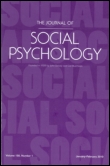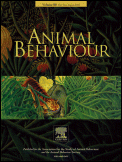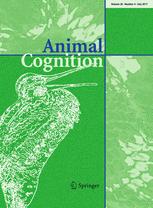
Comparative psychology refers to the scientific study of the behavior and mental processes of non-human animals, especially as these relate to the phylogenetic history, adaptive significance, and development of behavior. Research in this area addresses many different issues, uses many different methods and explores the behavior of many different species from insects to primates.

Animal cognition encompasses the mental capacities of non-human animals including insect cognition. The study of animal conditioning and learning used in this field was developed from comparative psychology. It has also been strongly influenced by research in ethology, behavioral ecology, and evolutionary psychology; the alternative name cognitive ethology is sometimes used. Many behaviors associated with the term animal intelligence are also subsumed within animal cognition.
Cognitive ethology is a branch of ethology concerned with the influence of conscious awareness and intention on the behaviour of an animal. Donald Griffin, a zoology professor in the United States, set up the foundations for researches in the cognitive awareness of animals within their habitats.

Evolution and Human Behavior is a bimonthly peer-reviewed academic journal covering research in which evolutionary perspectives are brought to bear on the study of human behavior, ranging from evolutionary psychology to evolutionary anthropology and cultural evolution. It is primarily a scientific journal, but articles from scholars in the humanities are also published. Papers reporting on theoretical and empirical work on other species may be included if their relevance to the human animal is apparent. The journal was established in 1980, and beginning with Volume 18 in 1997 has been published by Elsevier on behalf of the Human Behavior and Evolution Society. The editor-in-chief is Debra Lieberman.

The Journal of Personality and Social Psychology is a monthly peer-reviewed scientific journal published by the American Psychological Association that was established in 1965. It covers the fields of social and personality psychology. The editors-in-chief are Shinobu Kitayama, Colin Wayne Leach, and Richard E. Lucas.
Comparative cognition is the comparative study of the mechanisms and origins of cognition in various species, and is sometimes seen as more general than, or similar to, comparative psychology. From a biological point of view, work is being done on the brains of fruit flies that should yield techniques precise enough to allow an understanding of the workings of the human brain on a scale appreciative of individual groups of neurons rather than the more regional scale previously used. Similarly, gene activity in the human brain is better understood through examination of the brains of mice by the Seattle-based Allen Institute for Brain Science, yielding the freely available Allen Brain Atlas. This type of study is related to comparative cognition, but better classified as one of comparative genomics. Increasing emphasis in psychology and ethology on the biological aspects of perception and behavior is bridging the gap between genomics and behavioral analysis.

Bilingualism: Language and Cognition is a quarterly peer-reviewed academic journal of linguistics focusing on the study of multilingualism, including bilingual language competence, perception and production, bilingual language acquisition in children and adults, neurolinguistics of bilingualism, and non-linguistic cognitive processes in bilinguals. The journal is published by Cambridge University Press and was co-established by François Grosjean in 1998.

The Journal of Social Psychology is a bimonthly academic journal covering social psychology published by Routledge, who acquired it from Heldref Publications in 2009. The journal was established in 1929 by John Dewey and Carl Murchison. It covers all areas of basic and applied social psychology. The journal was subtitled Political, Racial and Differential Psychology until changing its name in 1949. The Journal incorporated with Genetic, Social, and General Psychology Monographs between 1925 - 2006

The Annual Review of Psychology is a peer-reviewed academic journal that publishes review articles about psychology. First published in 1950, its longest-serving editors have been Mark Rosenzweig (1969–1994) and Susan Fiske (2000–present). As of 2022, Journal Citation Reports gives the journal a 2021 impact factor as 27.782, ranking it first of 79 journal titles in the category "Psychology (Science)" and second of 147 titles in the category "Psychology, Multidisciplinary ".
Sara J. Shettleworth is an American-born, Canadian experimental psychologist and zoologist. Her research focuses on animal cognition. She is professor emerita of psychology and ecology and evolutionary biology at the University of Toronto.

Marc Bekoff is an American biologist, ethologist, behavioural ecologist and writer. He was a professor of Ecology and Evolutionary Biology at the University of Colorado Boulder for 32 years. He cofounded the Jane Goodall Institute of Ethologists for the Ethical Treatment of Animals, and he is Professor Emeritus of Ecology and Evolutionary Biology at the University of Colorado Boulder.

Animal Behaviour is a double-blind peer-reviewed scientific journal established in 1953 as The British Journal of Animal Behaviour, before obtaining its current title in 1958. It is published monthly by Elsevier for the Association for the Study of Animal Behaviour in collaboration with the Animal Behavior Society. It covers all aspects of ethology, including behavioural ecology, evolution of behaviour, sociobiology, ethology, behavioural physiology, population biology, and navigation and migration.

The Journal of Comparative Psychology is a peer-reviewed academic journal published by the American Psychological Association. It covers research from a comparative perspective on the behavior, cognition, perception, and social relationships of diverse species.
Animal Welfare is a quarterly, peer-reviewed scientific journal covering studies on the welfare of animals, whether in captivity or in the wild. Its scope includes animal welfare science, animal cognition, ethology, behavioural ecology, evolution of behaviour, sociobiology, behavioural physiology, population biology, neurophysiology and abnormal behaviour. It was established in 1992 and is published by the Universities Federation for Animal Welfare. The editor-in-chief is James K. Kirkwood.
Cognitive biology is an emerging science that regards natural cognition as a biological function. It is based on the theoretical assumption that every organism—whether a single cell or multicellular—is continually engaged in systematic acts of cognition coupled with intentional behaviors, i.e., a sensory-motor coupling. That is to say, if an organism can sense stimuli in its environment and respond accordingly, it is cognitive. Any explanation of how natural cognition may manifest in an organism is constrained by the biological conditions in which its genes survive from one generation to the next. And since by Darwinian theory the species of every organism is evolving from a common root, three further elements of cognitive biology are required: (i) the study of cognition in one species of organism is useful, through contrast and comparison, to the study of another species’ cognitive abilities; (ii) it is useful to proceed from organisms with simpler to those with more complex cognitive systems, and (iii) the greater the number and variety of species studied in this regard, the more we understand the nature of cognition.

The Journal of Experimental Psychology: Animal Learning and Cognition is a peer-reviewed academic journal published by the American Psychological Association. It covers research in experimental psychology, specifically pertaining to all aspects of animal behavior processes. It was established in 1975 as the Journal of Experimental Psychology: Animal Behavior Processes , an independent section of the Journal of Experimental Psychology. In 2014, the journal subtitle was changed to Animal Learning and Cognition. The editor-in-chief is Ralph R. Miller.
Plant cognition is the proposed cognition of plants. The study of plant cognition explores the idea that plants are capable of responding to and learning from stimuli in their surroundings in order to choose and make decisions that are most appropriate to ensure survival. Over recent years, experimental evidence for the cognitive nature of plants has grown rapidly and has revealed the extent to which plants can use senses and cognition to respond to their environments. Some researchers claim that plants process information in similar ways as animal nervous systems.
Developmental Review is a quarterly peer-reviewed academic journal which publishes review articles in the field of developmental psychology. Presenting research that bears on important conceptual issues in developmental psychology, Developmental Review: Perspectives in Behavior and Cognition provides lifespan, aging, infancy, child, and adolescent behavioral scientists with authoritative articles that reflect current thinking and cover significant scientific developments, with a particular emphasis on human developmental processes. It was created in 1981 by Charles Brainerd and is published by Elsevier. The current editor-in-chief is Valérie Camos. According to the Journal Citation Reports, the journal has a 2020 impact factor of 8.308.
Ecological Psychology is a quarterly peer-reviewed academic journal covering ecological psychology. It was established in 1989 and is published by Taylor & Francis. It is the official journal of the International Society for Ecological Psychology. The editor-in-chief is Richard C. Schmidt. According to the Journal Citation Reports, the journal has a 2016 impact factor of 1.227, ranking it 68th out of 84 journals in the category "Psychology, Experimental". Its major focus is on problems of perception, action, cognition, communication, learning, development, and evolution in all species, to the extent that those problems are related to whole animal-environment systems. human experimental psychology, developmental/social psychology, animal behavior, human factors, fine arts, communication, computer science, philosophy, physical education and therapy, speech, etc., can be considered as significant contributors.











